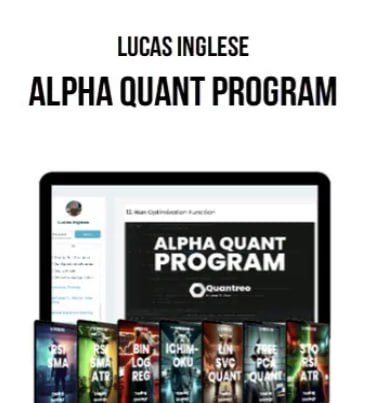Master the Art of Algorithmic Trading with the Lucas Inglese – Alpha Quant Program
The Alpha Quant Program by Lucas Inglese is an advanced educational journey into the world of quantitative finance and algorithmic trading. It is designed to empower traders and financial professionals with cutting-edge strategies and tools. This program is crafted to transform your understanding of financial markets and equip you with the skills needed to thrive in today’s fast-paced trading environment.
Why the Alpha Quant Program Stands Out
Lucas Inglese, a distinguished expert in quantitative trading, has developed the Alpha Quant Program to provide participants with a comprehensive understanding of the intricate mechanics of algorithmic trading. This course is perfect for those who want to transition from traditional trading methods to more sophisticated, data-driven strategies that capitalize on the latest advancements in financial technology.
Detailed Course Structure
The Alpha Quant Program is meticulously structured to ensure a deep and practical understanding of quantitative trading principles. It covers many topics, starting from the basics and moving toward more complex strategies that professional quants use daily.
Exploring Quantitative Finance
What is Quantitative Finance?
Quantitative finance involves the application of mathematical models and statistical techniques to analyze financial markets and develop trading strategies. In this module, you’ll explore the foundational concepts that form the backbone of modern economic analysis, including the evolution of quantitative methods and their role in shaping today’s markets.
How Does Quantitative Finance Impact Trading?
Understanding quantitative finance is essential for those looking to develop strategies that are profitable and resilient to market changes. This module lays the groundwork for more advanced topics, ensuring that participants have a solid grasp of the key concepts before proceeding.
Foundations of Algorithmic Trading
What Is the Role of Algorithms in Trading?
Algorithmic trading uses computer algorithms to execute trades at optimal speeds and prices, far surpassing the capabilities of manual trading. This section introduces the basics of algorithmic trading, covering its benefits, challenges, and the technological infrastructure required to implement it effectively.
How Do You Build a Reliable Algorithmic Trading System?
Participants will learn how to design, develop, and deploy algorithmic trading systems, including data collection, strategy formulation, backtesting, and execution. This module emphasizes the practical application of algorithmic trading, preparing students to implement these systems in live trading environments.
Data Analysis and Financial Modeling
Why Is Data Analysis Crucial in Trading?
Data is the lifeblood of quantitative trading. In this module, participants will dive deep into data analysis techniques, using programming languages like Python and R to manipulate financial datasets. You’ll learn to clean and prepare data for analysis, ensuring that your trading models are built on accurate and reliable information.
What Financial Models Will You Learn to Build?
This module teaches you how to construct and test quantitative models for predicting asset prices, volatility, and other financial metrics. You’ll gain hands-on experience applying statistical methods and machine learning algorithms to create models that generate actionable trading signals.
Portfolio Optimization and Risk Management
How Do You Build a Diversified Portfolio?
Creating a well-balanced portfolio is key to long-term investment success. In this module, you’ll explore advanced portfolio optimization techniques that help you allocate assets to maximise returns while minimizing risk. The course covers essential topics like asset correlation, diversification, and modern portfolio theory.
What Risk Management Strategies Will You Master?
Effective risk management is crucial in trading, mainly when dealing with leveraged or high-frequency strategies. This module comprehensively covers risk management techniques, including value-at-risk (VaR), stress testing, and scenario analysis. You’ll learn how to apply these concepts to protect your portfolio from adverse market conditions.
Advanced Algorithmic Trading Strategies
What Strategies Are Used by Professional Quants?
In this module, you’ll explore advanced algorithmic trading strategies, including mean reversion, statistical arbitrage, and machine learning-based approaches. Professional quants use these strategies to generate consistent returns across various market conditions.
How Do You Optimize and Backtest Trading Strategies?
Backtesting is an essential step in developing any trading strategy. This module teaches you how to rigorously test your strategies using historical data to evaluate their performance. You’ll also learn how to optimize your strategy by adjusting parameters and improving model accuracy.
High-Frequency Trading and Market Microstructure
What Is High-Frequency Trading?
High-frequency trading (HFT) involves executing a large number of orders within very short time frames, often milliseconds or microseconds. This module provides an in-depth look at the techniques used in HFT, including latency optimization, order flow analysis, and market microstructure.
How Do You Navigate the Complexities of Market Microstructure?
Understanding market microstructure is crucial for anyone involved in high-frequency or algorithmic trading. This module covers key concepts, such as order types, market impact, and the behaviour of limited order books. You’ll learn how to use this knowledge to gain an edge in the market.
Trading Technology and Infrastructure
What Are the Technical Requirements for Algorithmic Trading?
Algorithmic trading requires a robust technological infrastructure, including fast data feeds, powerful computing resources, and reliable execution platforms. This module guides you through the process of setting up and optimizing your trading infrastructure to achieve low-latency performance and high reliability.
How Do You Choose the Right Trading Platform and Tools?
Participants will learn about different trading platforms, APIs, and execution brokers, as well as the tools needed to monitor and manage trades. This module emphasizes the importance of selecting the right technology stack to support your trading strategies.
Regulatory Considerations and Compliance
What Are the Key Regulations for Algorithmic Traders?
The world of algorithmic trading is heavily regulated to ensure market fairness and protect investors. This module covers the most important regulatory frameworks, such as MiFID II in Europe and Reg NMS in the U.S., and explains how to ensure compliance in your trading activities.
How Do You Maintain Compliance in Algorithmic Trading?
Participants will learn how to implement compliance measures, such as audit trails and monitoring systems, to meet regulatory requirements. This module also covers the ethical considerations of algorithmic trading, ensuring that your strategies align with industry standards and best practices.
Performance Evaluation and Strategy Refinement
How Do You Measure the Success of Your Trading Strategies?
Measuring performance is essential for refining and improving your trading strategies. This module teaches participants how to evaluate their strategies using key performance metrics, such as the Sharpe ratio, alpha, beta, and maximum drawdown. You’ll also learn how to factor in transaction costs and slippage to get an accurate picture of strategy performance.
How Do You Continuously Improve Your Trading Strategies?
The financial markets are constantly evolving, and so should your strategies. This module focuses on the continuous improvement of trading strategies, using feedback from performance evaluations to make iterative enhancements.
Who Should Enroll in the Alpha Quant Program?
The Alpha Quant Program is ideal for:
- Aspiring Quantitative Traders: Those who want to break into the field of quantitative finance and algorithmic trading.
- Experienced Traders: Professionals looking to enhance their trading strategies with advanced quantitative techniques.
- Portfolio Managers: Individuals responsible for managing investment portfolios who wish to integrate quantitative methods into their practice.
- Financial Engineers: Experts in financial modeling who want to apply their skills to trading and investment strategies.
Conclusion: Achieve Excellence in Quantitative Finance
The Lucas Inglese – Alpha Quant Program offers an unparalleled education in quantitative finance and algorithmic trading. Whether you’re a newcomer to the field or an experienced professional, this course provides the knowledge and tools you need to excel. With its comprehensive curriculum, hands-on learning approach, and expert instruction, the Alpha Quant Program prepares you to succeed in the highly competitive world of financial markets.
Enroll in the Alpha Quant Program today and take a significant step towards mastering the art and science of algorithmic trading.







